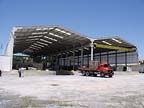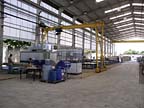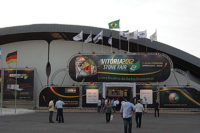

The new facility currently stands at 45,000 square feet, and it is being completed in multiple phases. It processes slabs as well as a wide variety of cut-to-size products, and architectural work will be a major focus for the operation as it continues to grow. A local architectural firm has designed a sophisticated, modern exterior for the final facility, with an adjacent lake to create a peaceful environment. “The idea is to have a building where architects and developers will feel like they are in an office, and not in a factory,†explained owner Paulo Lacombe of Proton. Of course, the building will also serve as an example of premium stonework, with a detailed granite facade.
Lacombe's ambition is to offer the entire package of stone production, from quarrying to the finished project -- including installation. It also wants to focus heavily on the quality of its work. Although Proton has 2.5 acres of land at the Vitoria site, it doesn't want to grow to a point where management cannot maintain close control of the quality. “I don't want a larger plant than this,†Lacombe explained. “If we need to expand, I will build another factory.â€
For slab production, Proton has a line for resin-treating slabs with Tenax products. The line includes automatic equipment for applying the resin as well as a drier to speed curing. Final polishing is not done with a typical slab polishing line, however, but with a bed polisher. This is necessary because materials such as Sea Foam Green granite need extra attention to detail during polishing, and a bed polisher allows the operator to oversee the process and monitor which sections of a particular slab need more attention.
For cut-to-size work, the company relies on a bridge saw from Bombieri and Venturi of Italy, but it also depends a great deal on the individual skills of its workers, as much of the work is done by hand. All of the stone processing is done wet to eliminate dust, and water is treated with machinery from Water Filtration System of Italy.
Overall, the factory polishes 12 containers of slabs per month, totaling 40,000 square feet. In the near future, other equipment to be added includes multi-wire saws for processing blocks into slabs of various thicknesses. It is also adding CNC technology.
Proton's quarries include Sea Foam Green, Tunas Classico, Verniz Tropical and Tropical White, and a new material is Verde Versace marble. According to Lacombe, the goal is to add value through exclusive stones as well as exclusive design ideas and concepts. The company has two designers on staff, and it works directly with architects. At the time of Stone World's visit to the facility, the company was completing work on sandblasted White Itaunas countertops for a condominium project in Sao Paulo by a renowned architect.
In the kitchen countertop sector, Proton works with SCA, a leading manufacturer of cabinets in Brazil, with 150 stores. The sales process essentially works the same as cabinet distribution, where Proton fills individual custom orders from its plant.
